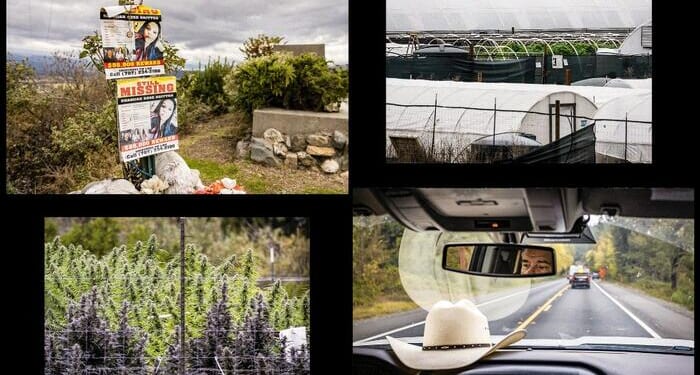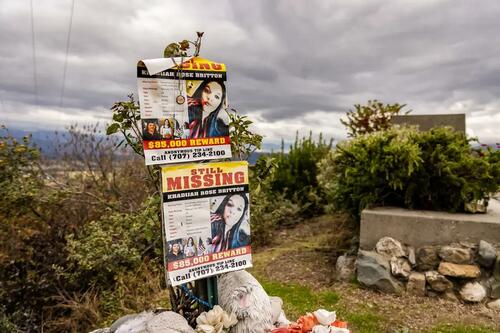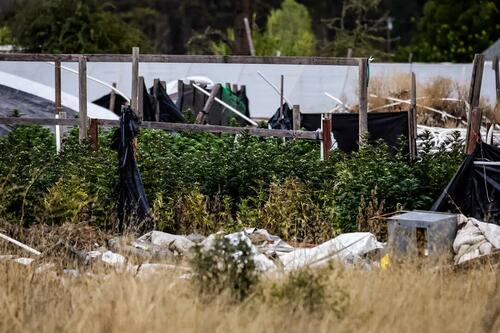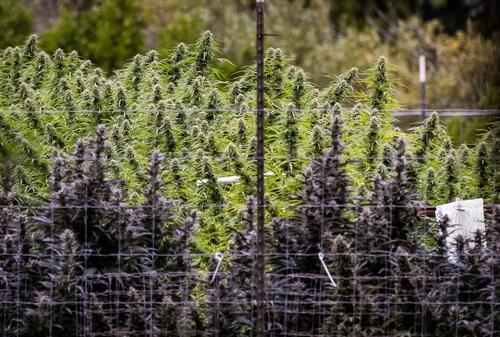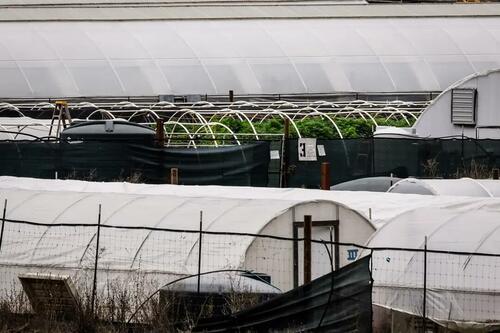Authored by Brad Jones via The Epoch Times (emphasis ours),
COVELO, Calif.—Driving up the steep and windy road from his station in Ukiah, Mendocino County Sheriff Matt Kendall stops his pickup at a pullout overlooking California’s Round Valley.

“It’s where the trouble begins and never ends,” he told The Epoch Times.
Native American sovereignty and California’s policies that shield illegal immigrants have allowed Mexican drug cartels to swoop in on tribal lands of the Round Valley Indian Tribes, a confederation of several tribes, the sheriff said.
The valley, known for illegal marijuana grows on tribal lands, is remote and surrounded by forested mountainous terrain. It’s a patchwork of tribal lands and those sold off to private owners years ago.
Kendall, 56, grew up here in the 1970s. During the drive to Covelo, an isolated town in the valley, he talks about how the times have changed over the decades.
“Back in the ’60s and ’70s, it was a beautiful place—a lot of freedom here,” he said. “When we were kids, we’d be riding our horses and having fun. Every kid in this valley had a horse. We’d go out to the river. All of us had summertime jobs, hauling hay and cutting firewood.”
His nostalgic journey ends abruptly as he passes a burned-out building with murals of missing women on its walls—a stark reminder of the violence that plagues the valley. Other banners along the road display their names and faces, including that of Khadijah Rose Britton, a native American woman who, according to the FBI, was last seen in Covelo being kidnapped at gunpoint in 2018.
Today, Kendall says, “there’s a little bit of farming, and then just tons and tons of marijuana, and pretty much all of it is illegal.”
“We see a lot of Hispanics here when there is no work, no sawmill jobs, no grapes, no vineyards and not much logging. They’re all here taking orders to grow marijuana, and a lot of it’s happening on tribal lands.”
He estimates up to 80 percent of the illegal marijuana in Mendocino County is grown on tribal lands, based on aerial surveillance and satellite imagery revealing a vast network of illegal grow ops.
Mexican Cartels
Kendall first encountered Mexican cartels in his county in the mid-1990s.
“I got shot at right over there in a Mexican grow” 25 years ago, he said, pointing to a footpath through the brush. “A guy pops out of a tent with a 12-gauge and I’m screaming at him in English and Spanish, ‘Drop it or I’m going to drop you!’ and he takes off running and gets a round off at me over his shoulder.”
Years ago, a group of Hispanics growing marijuana in the hills “were digging up artifacts and just tearing things up,”’ Kendall said. “We hit this place with search warrants years ago. We got thousands of plants.”
Today, even though the cartels and the laborers who work for them cultivating and harvesting the illicit marijuana are mostly illegal immigrants, Kendall is not legally allowed to call in Immigration and Customs Enforcement (ICE) due to state Senate Bill 54, signed in 2018 by former Gov. Jerry Brown.
The law prohibits state and local law enforcement from using their resources to assist federal immigration enforcement agencies, including ICE, and forbids them from asking about a person’s immigration status or sharing confidential information with federal agents.
Today, two competing Mexican cartels, Jalisco New Generation Cartel and La Familia Michoacana, are exploiting California’s sanctuary state policies and the sovereignty of native tribes to illegally grow marijuana in the county, the sheriff said.
The cartels have tagged their territory with spray paint in different areas of the valley, he said.
Shootouts Are Common
“We know that we’ve got some hard hitters from a cartel in the Mexican state of Michoacán,” said Kendall, who suspects a shootout in the hills in May was infighting among La Familia Michoacana members, known for gun battles in the streets of Mexico.
A roadside shrine with a crucifix marks the site where Jorge M. Zavala Estrella, 30, was shot and killed in the shootout.
“These guys had some bad blood over money and grow operations, and they met nose-to-nose right up here,” he said, pointing out the spot on Hulls Valley Road.
Another man was shot about a dozen times and was bleeding out near the edge of the road when deputies found him. He was airlifted to an out-of-county hospital and survived, the sheriff said.
A third and fourth suspect were also involved in the gun battle, and the homicide investigation is ongoing, Kendall said.
Kendall estimates about 300 shots were fired.
“There was brass collected everywhere,” he said.
Shootouts are common, he said, “about three or four every year,” and firearms used include AK-47s, AR-15s and M-16s.
Kendall suspects the money for infrastructure to grow illegal marijuana is coming from south of the border because the toxic chemical containers are labeled in Spanish and most local residents can’t afford to pay for hoop houses and haul in soil and water.
“Somebody’s putting up the money for this,” he said. “There are millions of dollars being poured into the marijuana industry up here.”
Narco-slavery
The Biden administration’s “wide open” border policies made things worse in Mendocino, he said.
“I’m not playing partisan politics here,” Kendall said. “It’s a fact. Borders were open.”
Illegal immigrants who couldn’t pay the full fare to Mexican cartels to cross into the United States fell into debt with the Mexican cartels, and much of that debt is being worked off in the marijuana grows, Kendall said.
Over the last few years, Kendall’s deputies have seen an increase in human trafficking cases as the cartels bring in more illegal immigrants to cultivate, trim, and harvest the illegal marijuana crops.
“It’s sex trafficking, it’s labor trafficking, it’s narco-slavery,” he said.
One victim told Kendall after he crossed the border from Mexico into the United States, he was picked up in California and informed by the driver working for a cartel he would be taken to Washington state to work in the “logging industry.”
“I’ve spoken with a lot of people in marijuana grows—once they’re caught—who have been trafficked, and didn’t realize it,” he said.
Kendall found the man months later in Mendocino, one of three Northern California counties—including Trinity and Humboldt—that comprise the Emerald Triangle, an area long known for cannabis cultivation.
“He’s in the middle of the forest, in the middle of nowhere, in a weed grow. He has no idea where he is. He thinks he’s in the state of Washington. He doesn’t know anyone, except for a couple of other clowns that are also working there. He doesn’t know how to get out of there,” the sheriff said.
“So, where do you start to find your way home? He’s in a foreign country. He doesn’t speak the language, and these guys show up and bring food now and then. And, whether he knows it or not, he has been trafficked.”
The man told him the cartels promised to pay him for his labor at the end of the growing season but didn’t, Kendall said.
“A lot of these folks I’ve spoken to aren’t getting paid at all,” he said. “We had two people wander out of the brush—husband and wife. They weren’t getting paid. They wanted to leave, and the gate was locked, and the boss goes and lights their car on fire.”
Many of the laborers at illegal grow sites in several California counties live in squalor at makeshift camps where their basic human needs are not being met, and they aren’t there of their own free will, he said.
“They’re scared to death of the cartels,” Kendall said. “They wind up here, but they’re still under that control.”
‘We’re Not Mayberry’
The sheriff’s department is underfunded, understaffed, and under-equipped to deal with all the crime related to illegal marijuana grow operations, he said.
“This is cartel violence that not even the United States government seems to be able to handle, and we’re expected to take it on when we’ve got six deputies for 3,500 square miles,” Kendall said.
“We’re not Mayberry,” he said, referring to the quaint, fictional town in the 1960’s TV series about a rural police department. “I wish we were because we’d have enough personnel to handle Mayberry.”
Kendall isn’t looking forward to the coming weeks of harvest season, which usually means more robberies, murders, and mayhem.
“There’s cash, there’s marijuana, there’s greed,” he said.
Tribes Sue Sheriff
Tribal sovereignty also poses a challenge for law enforcement. In April, the Round Valley Indian Tribes and three residents of the reservation filed a lawsuit against Kendall and other law enforcement agencies over raids that occurred on tribal land in July 2024. The lawsuit alleges sheriff’s deputies failed to produce valid search warrants and illegally destroyed medicinal cannabis gardens and cultivation.
Kendall wouldn’t comment on specifics related to the case but said the tribes are trying to assert their sovereignty over marijuana grown on tribal lands.
While the tribes “should have sovereignty,” the sheriff said he has received complaints from tribal members saying the reservation has been overrun by cartels.
“We’ve had some really good, forward thinking tribal leaders over the years—really good people—but there’s a little ebb and flow where we’ll get some people in who are making money off the marijuana, and the rules change,” Kendall said.
Reservations are often the “canary in the coal mine,” he said. “If something goes south there, because it’s a very close, tight-knit community, it’s going to go south across the entire county,” he said.
Kendall says partisan politics are getting in the way of law enforcement and public safety, but he does his best to stay out of the fray.
“I’m careful what I say because I don’t want to alienate people, but I still have to tell the truth,” he said, adding that one of the more important things he can do is to call out corruption and deception. “There’s a very small portion of people who are making money on it, and they are being bullies and creeps, intimidators, knee-cappers, to the good people.”
Kendall says he’s repeatedly called California Gov. Gavin Newsom but the governor won’t return his calls.
Read the rest here…
Loading recommendations…

